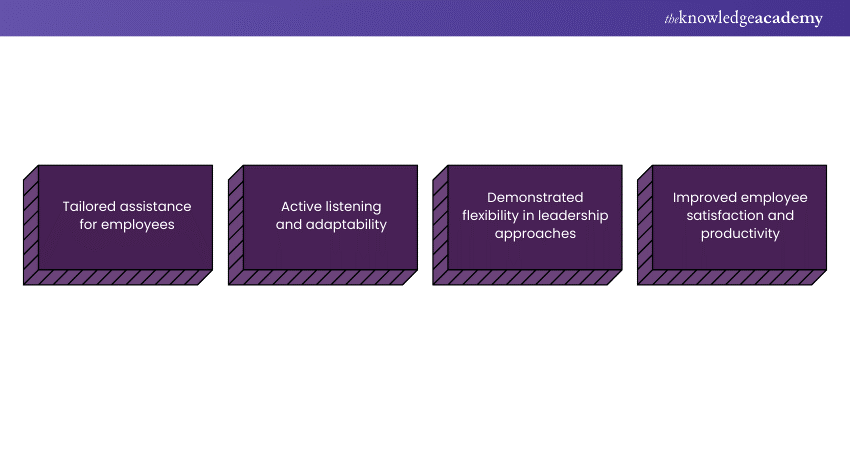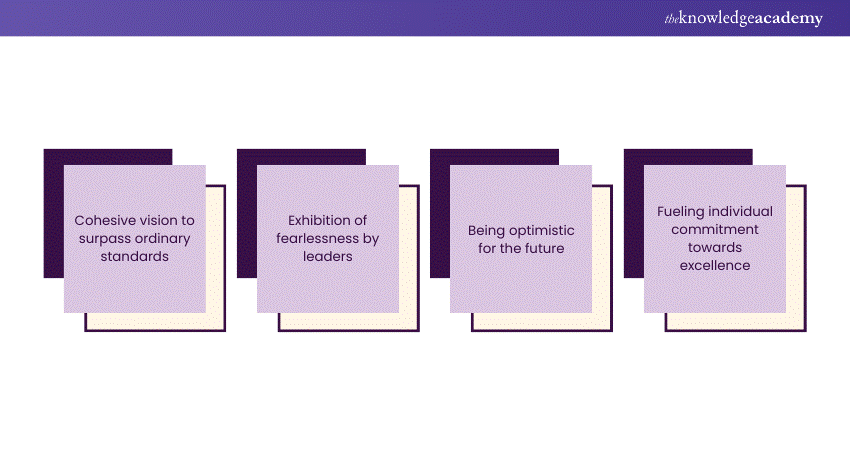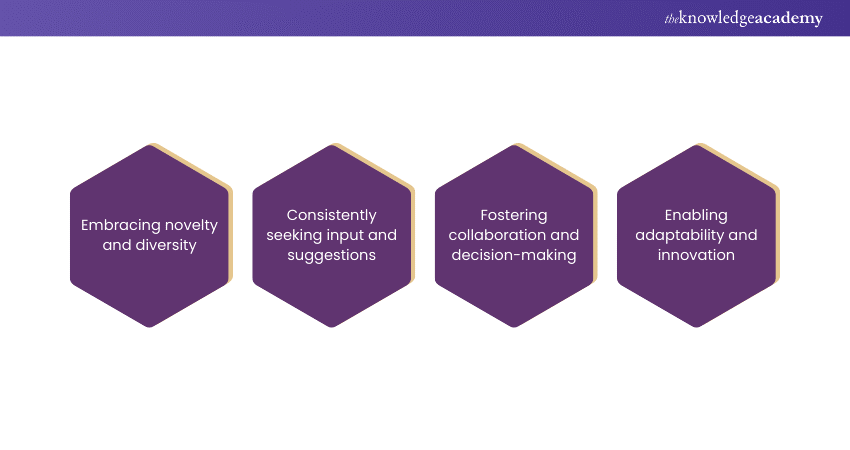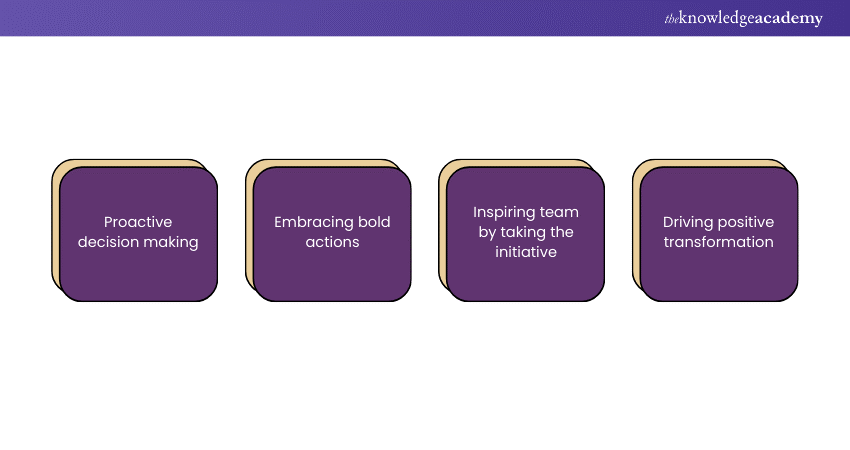We may not have the course you’re looking for. If you enquire or give us a call on 01344203999 and speak to our training experts, we may still be able to help with your training requirements.
Training Outcomes Within Your Budget!
We ensure quality, budget-alignment, and timely delivery by our expert instructors.

Transformational Leadership emerges as a powerful paradigm characterised by its ability to inspire, motivate, and drive positive change within organisations. This Leadership approach transcends traditional managerial roles, focusing on fostering innovation, cultivating trust, and empowering individuals to reach their fullest potential. Explore the power of Transformational Leadership, inspiring positive change and fostering growth within organisations.
Table of Contents
1) What is Transformational Leadership?
2) Four components of Transformational Leadership
3) Illustrative instances of Transformational Leadership
4) Unpacking the Transformational Leadership theory
5) Traits of successful Transformational Leaders
6) Conclusion
What is Transformational Leadership?
The Transformational Leadership approach fosters employee innovation and drives organisational change to ensure future success. This is achieved by top executives leading by example, prioritising authenticity, fostering a strong corporate culture, promoting employee ownership, and encouraging workplace autonomy.
Furthermore, Transformational Leaders act as catalysts for change within the organisation, adept at recognising emerging trends in technology and facilitating their integration. They empower employees by entrusting them with decision-making authority, avoiding micromanagement.
More importantly, such a management style nurtures creativity, forward-thinking, and problem-solving. Furthermore, it cultivates future Transformational Leaders through mentorship and training, preparing them to uphold the ethos of innovation and adaptability.
Four components of Transformational Leadership
Transformational Leaders collaborate with their teams to enact impactful change, leveraging qualities like effective communication, charisma, adaptability, and empathetic support. This Leadership style encompasses four core elements:
a) Personalised consideration

Transformational Leaders attentively attend to the concerns and requirements of their employees, ensuring they offer tailored assistance. They operate under the recognition that motivations vary among individuals, understanding that what inspires one may not necessarily motivate another.
Consequently, they demonstrate flexibility in adjusting their Leadership approaches to suit the diverse needs of team members. These Leaders foster an inclusive and supportive work environment by actively listening and adapting their management styles accordingly.
This adaptability enhances employee satisfaction, engagement, and productivity, ultimately contributing to the collective success of the team and organisation as a whole.
b) Exemplary influence
Exemplary influence, a pivotal element of Transformational Leadership, embodies Leaders who are role models of ethical behaviour and values. These Leaders inspire trust and admiration through their integrity, authenticity, and consistency in their actions.
By adhering to high moral standards, they establish a foundation of respect and credibility within their teams and organisations. Their unwavering commitment to principles guides decision-making and fosters a culture of integrity and accountability.
Transformational Leaders set a compelling example for others to emulate through their actions, promoting a shared commitment to excellence and ethical conduct throughout the organisation, thereby driving positive change and fostering collective success.
c) Intellectual stimulation
Transformational Leaders consistently question assumptions, embrace risk-taking, and actively seek input and ideas from their team members. They cultivate an environment where failure is not feared but viewed as an opportunity for growth.
Such an inclusive culture encourages creativity, open dialogue, and the expression of diverse viewpoints. By fostering a safe space for collaboration, these Leaders empower employees to exercise autonomy, ask critical questions, and explore innovative approaches to task execution.
This approach not only stimulates employee engagement and ownership but also promotes continuous improvement. It also promotes the development of more effective strategies within the organisation, ultimately driving success and resilience.
d) Vision articulation

Transformational Leaders possess the capability to express a cohesive vision that inspires team members to surpass ordinary standards. They comprehend that highly motivated employees are those driven by a profound sense of purpose.
These Leaders exhibit fearlessness in challenging their teams, maintaining an optimistic outlook toward future objectives, and adeptly imbuing significance into assigned tasks. They cultivate a collective drive toward achieving ambitious goals by instilling a shared purpose and fostering optimism.
These Leaders empower individuals to see beyond the present, fuelling their commitment to realising the organisation's vision through meaningful contributions and proactive engagement in pursuit of excellence.
Illustrative instances of Transformational Leadership
Below are the various instances of Transformational Leadership:
a) Oprah Winfrey
Renowned for her charismatic and visionary Leadership style, the media mogul is celebrated for her ability to inspire and motivate others. Her dynamic approach to Leadership ignites enthusiasm and fosters a sense of purpose among her team, driving innovation and success in the industry.
b) Barack Obama

Renowned for his transformative governance style, the ex-U.S. President was celebrated for his ability to inspire and unite through his optimistic and motivating communication. His Leadership approach galvanised individuals, fostering a sense of hope and unity while driving positive change across the nation.
c) Nelson Mandela
The former President of South Africa was renowned for his genuine ability to inspire others profoundly. His authenticity and Leadership served as a beacon of hope and empowerment, resonating not only within his nation but across the globe, leaving an enduring legacy of inspiration and Leadership.
Unpacking the Transformational Leadership theory
The concept of Transformational Leadership originated with James V. Downton in 1973 and was further developed by James Burns in 1978. Bernard M. Bass expanded on this concept in 1985, introducing methods for measuring the efficacy of Transformational Leadership.
This model advocates for Leaders to demonstrate genuine and robust Leadership, aiming to inspire employees to emulate these qualities. Although Bass introduced the theory of Transformational Leadership in the 1970s, its relevance persists to this day.
The essence of authentic Leadership remains unchanged, adapting to different contexts over time. This Leadership style is applicable across various industries but holds particular significance in the dynamic tech sector, where innovation and agility are paramount for organisational success.
Traits of successful Transformational Leaders
When contemplating the Transformational Leadership approach, you might be curious about its practical manifestations. Here's a breakdown of several habits typical among proficient Transformational Leaders. Presented below are five fundamental characteristics:
a) Maintaining an open mind

Embracing novelty and diverse viewpoints is integral to Transformational Leadership. Instead of hastily drawing conclusions, these Leaders consistently seek input and suggestions from various channels, fostering a culture of collaboration and informed decision-making. This openness facilitates adaptability and innovation, driving organisational growth and success in dynamic environments.
b) Leading with humility
Transformational Leaders are comfortable acknowledging their limitations in knowledge. While they maintain confidence in their objectives and capabilities, they prioritise the well-being of their team or organisation over personal pride. This humility fosters trust and collaboration, enabling effective decision-making and sustainable growth within the entity.
c) Practicing self-awareness
Transformational Leaders prioritise self-improvement, recognising both their strengths and areas for growth. They engage in regular self-reflection, setting short-term objectives to enhance their skills and knowledge.
Moreover, embracing a culture of continuous learning, these Leaders advocate for ongoing development for themselves and their team, fostering a dynamic and innovative organisational environment.
d) Proactive approach of good Transformational Leaders

Leaders must not passively await change; instead, they must proactively make decisions and embrace bold actions that can influence others' behaviour. By taking initiative, Leaders set a precedent, inspiring their team members to adopt a similarly proactive approach toward achieving organisational goals and driving positive transformation.
e) Adaptability and innovation are hallmarks of the best Transformational Leaders
Influential Transformational Leaders grasp the evolving business landscape and continuously seek inventive methods to remain at the forefront. They are willing to deviate from conventional practices that may have yielded success previously, demonstrating a forward-thinking mindset as they navigate future opportunities and challenges.
Motivate and inspire your team by signing up for our Leadership Courses now!
Conclusion
In conclusion, Transformational Leadership stands as a beacon of inspiration and innovation in today's dynamic organisational landscape. By embodying authenticity, fostering collaboration, and embracing continuous growth, Transformational Leaders propel their teams towards success, driving positive change and shaping the future of Leadership in diverse industries.
Frequently Asked Questions

To contribute to the Transformational Leadership Council, start by researching their current initiatives and areas of focus. Consider contacting the council to express your interest and inquire about opportunities for involvement. Showcase your relevant skills, experiences, and passion for Transformational Leadership in your communication.

The Transformational Leadership Council (TLC) is a prestigious organisation comprising thought Leaders, innovators, and influencers dedicated to promoting and advancing Transformational Leadership principles. It serves as a platform for collaboration, networking, and sharing best practices among its members, who include CEOs, authors, speakers, and experts from various fields

The Knowledge Academy takes global learning to new heights, offering over 30,000 online courses across 490+ locations in 220 countries. This expansive reach ensures accessibility and convenience for learners worldwide.
Alongside our diverse Online Course Catalogue, encompassing 17 major categories, we go the extra mile by providing a plethora of free educational Online Resources like News updates, Blogs, videos, webinars, and interview questions. Tailoring learning experiences further, professionals can maximise value with customisable Course Bundles of TKA.

The Knowledge Academy’s Knowledge Pass, a prepaid voucher, adds another layer of flexibility, allowing course bookings over a 12-month period. Join us on a journey where education knows no bounds.

The Knowledge Academy offers various Leadership Courses, including Leadership Skills, Creative Leader Thinking and Creative and Analytical Thinking. These courses cater to different skill levels, providing comprehensive insights into Leadership Qualities.
Our Leadership Training blogs cover a range of topics related to Leadership and analytical thinking, offering valuable resources, best practices, and industry insights. Whether you are a beginner or looking to advance your Leadership skills, The Knowledge Academy's diverse courses and informative blogs have you covered.
Upcoming Business Skills Resources Batches & Dates
Date
 Leadership Skills Training
Leadership Skills Training
Fri 28th Feb 2025
Fri 11th Apr 2025
Fri 27th Jun 2025
Fri 22nd Aug 2025
Fri 24th Oct 2025
Fri 12th Dec 2025







 Top Rated Course
Top Rated Course



 If you wish to make any changes to your course, please
If you wish to make any changes to your course, please


